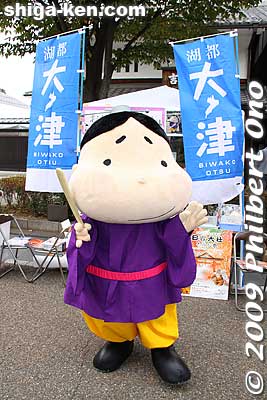Otsu, Shiga: Difference between revisions
No edit summary |
|||
| (13 intermediate revisions by the same user not shown) | |||
| Line 30: | Line 30: | ||
TotalArea = 374.06 | | TotalArea = 374.06 | | ||
PopDate = | PopDate = 2022-10-01 | | ||
Population = | Population = 344,470 (?? foreigners) | | ||
Founded = 1898 | | Founded = 1898 | | ||
| Line 53: | Line 53: | ||
Sakamoto 077-578-6565 | Sakamoto 077-578-6565 | ||
Shiga-cho 077-592-0378| | Shiga-cho 077-592-0378| | ||
TouristLink = [https:// | TouristLink = [https://otsu.or.jp/ Tourism Ass.] | [https://www.shiga.org/ Shiga-cho Tourism] | | ||
Kokusai = [https://oiga.jp/ Web site] | Kokusai = [https://oiga.jp/ Web site] Phone: 077-525-4711 | | ||
VolunteerGuide = | VolunteerGuide = [https://otsu.or.jp/information/info197 Website] | ||
}} | }} | ||
</div> | </div> | ||
by [[Philbert Ono]], ''Updated: | by [[Philbert Ono]], ''Updated: Nov. 12, 2022'' | ||
'''''Capital of Shiga Prefecture''''' | '''''Capital of Shiga Prefecture''''' | ||
Otsu (大津市; Otsu-shi) is a city in southern [[Shiga Prefecture]] and the prefecture's capital. The Shiga Prefectural Government building is near JR [[Otsu Station]]. | Otsu (大津市; Otsu-shi) is a city in southern [[Shiga Prefecture]], Japan and the prefecture's capital. The Shiga Prefectural Government building is near JR [[Otsu Station]]. | ||
'''Famous for:''' | |||
*Prefecture capital and most populous city of Shiga Prefecture. | |||
*Gateway to southern Lake Biwa with boat cruises and sandy beaches (especially Omi-Maiko). | |||
*Sacred Mt. Hiei and Enryakuji Temple, World Heritage Site. | |||
*National Treasure temples and shrines including Miidera, Ishiyama-dera, and Hiyoshi Taisha. | |||
*Major festivals including Sanno Matsuri and Otsu Matsuri. | |||
*''Omi Hakkei'' (Eight Views of Omi) including Ukimido Floating Temple at Katata, pine tree at Karasaki Shrine, and Seta-no-Karahashi Bridge. | |||
One of Shiga's main gateways and adjacent to Kyoto (10 min. by train), Otsu occupies almost the entire southern shore of Lake Biwa. It thus has a very long lakeshore coast. Best known for World Heritage Site temples such as Enryakuji on Mt. Hiei (one of Japan's three most sacred temple mountains) and National Treasures at Ishiyama-dera and Miidera (Onjoji) temples. It also boasts white sand beaches along the western shore and cruises on Lake Biwa. | One of Shiga's main gateways and adjacent to Kyoto (10 min. by train), Otsu occupies almost the entire southern shore of Lake Biwa. It thus has a very long lakeshore coast. Best known for World Heritage Site temples such as Enryakuji on Mt. Hiei (one of Japan's three most sacred temple mountains) and National Treasures at Ishiyama-dera and Miidera (Onjoji) temples. It also boasts white sand beaches along the western shore and cruises on Lake Biwa. | ||
Otsu, with its Kyoto-influenced temples, convenient transportation links to Kyoto, lake beaches frequented by Kyotoites, and the Lake Biwa Canal supplying water to Kyoto (and Osaka), is almost a satellite or extension of neighboring Kyoto and has never really developed its own unique identity. However, it is an interesting city in its own right with many major places of interest of its own | Otsu, with its Kyoto-influenced temples, convenient transportation links to Kyoto, lake beaches frequented by Kyotoites, and the Lake Biwa Canal supplying water to Kyoto (and Osaka), is almost a satellite or extension of neighboring Kyoto and has never really developed its own unique identity. However, it is an interesting city in its own right with many major places of interest of its own. | ||
For the 2020 Tokyo Olympics, Shiga Prefecture and Otsu | The main city center is around [[Biwako Hama-Otsu Station]] on the Keihan Line and next to the boat cruise port, shopping mall, and hotels. Most of Otsu's attractions are along the Keihan Line instead of the Tokaido Line. [https://shiga-ken.com/blog/2016/12/renovated-otsu-station-building-reopens/ Otsu Station has also been totally renovated] and now boasts a great choice of restaurants and a capsule hotel. Here and there in Otsu, you may also see [https://shiga-ken.com/blog/2015/10/otsu-e-paintings-now-and-then/ Otsu-e paintings] of an ogre or wisteria maiden, one of Shiga's unique art forms. | ||
For the 2020 Tokyo Olympics, Shiga Prefecture and Otsu supposed to be the host town for Denmark's rowing team. | |||
<HTML><iframe src="https://www.google.com/maps/embed?pb=!1m18!1m12!1m3!1d208970.63291800584!2d135.78959866417483!3d35.077581396928956!2m3!1f0!2f0!3f0!3m2!1i1024!2i768!4f13.1!3m3!1m2!1s0x600174ece1b10c2d%3A0x8bccbbd569908646!2sOtsu%2C+Shiga+Prefecture!5e0!3m2!1sen!2sjp!4v1470148274085" width="600" height="450" frameborder="0" style="border:0" allowfullscreen></iframe></HTML> | <HTML><iframe src="https://www.google.com/maps/embed?pb=!1m18!1m12!1m3!1d208970.63291800584!2d135.78959866417483!3d35.077581396928956!2m3!1f0!2f0!3f0!3m2!1i1024!2i768!4f13.1!3m3!1m2!1s0x600174ece1b10c2d%3A0x8bccbbd569908646!2sOtsu%2C+Shiga+Prefecture!5e0!3m2!1sen!2sjp!4v1470148274085" width="600" height="450" frameborder="0" style="border:0" allowfullscreen></iframe></HTML> | ||
| Line 108: | Line 118: | ||
'''Must See''' | '''Must See''' | ||
* [https://photoguide.jp/pix/thumbnails.php?album=111 Enryakuji 延暦寺] - One of the largest temple complexes in Japan, Enryakuji is the headquarters of the Tendai Buddhist sect and World Heritage Site atop Mt. Hie in Otsu, Shiga Prefecture. The temple was founded by Saicho to protect Kyoto from the demons of the northeast. Mt. Hiei can be called the birthplace of Japanese Buddhism as many founders of Japanese Buddhist sects once trained on Mt. Hiei. | * [https://photoguide.jp/pix/thumbnails.php?album=111 Enryakuji 延暦寺] - One of the largest temple complexes in Japan, Enryakuji is the headquarters of the Tendai Buddhist sect and World Heritage Site atop Mt. Hie (elevation 848 m) in Otsu, Shiga Prefecture. The temple was founded by Saicho to protect Kyoto from the demons of the northeast. Mt. Hiei can be called the birthplace of Japanese Buddhism as many founders of Japanese Buddhist sects once trained on Mt. Hiei. They include Honen (Jodo-shu), Shinran (Jodo Shinshu), and Nichiren. The entire mountain is the grounds of Enryakuji Temple and used as a religious training ground for centuries. The mountain is consdered to be the "body" of the founder and the trees are his religious clothing. Temple priests therefore carefully maintain trees and plants on the mountain. However, like in other parts of Shiga, wild deer has been a problem for trees and forests for the past 30 years. The temple's main worship hall, the Konpon Chudo (National Treasure), is undergoing a major 10-year renovation until 2025. While parts of it might be covered or closed to visitors, part of the renovation work is also open to the public. A rare look at how they repair a temple. The mountain also has the scenic Hie-zan Driveway offering panoramic views of Lake Biwa. [http://goo.gl/maps/1FGKK Map] | ||
* [https://photoguide.jp/pix/thumbnails.php?album=148 Ishiyama-dera 石山寺] - Founded in 749, Ishiyama-dera, belonging to the Shingon Buddhist Sect, is the 13th Temple of the Saigoku Pilgrimage. Lady Murasaki Shikibu is said to have written the epic novel, "The Tale of Genji" in a room at this temple. The fall colors are also brilliant. [http://goo.gl/maps/q1ZDm Map] | * [https://photoguide.jp/pix/thumbnails.php?album=148 Ishiyama-dera 石山寺] - Founded in 749, Ishiyama-dera, belonging to the Shingon Buddhist Sect, is the 13th Temple of the Saigoku Pilgrimage. Lady Murasaki Shikibu is said to have written the epic novel, "The Tale of Genji" in a room at this temple. The fall colors are also brilliant. [http://goo.gl/maps/q1ZDm Map] | ||
| Line 117: | Line 125: | ||
* [https://photoguide.jp/pix/thumbnails.php?album=130 Hiyoshi Taisha 日吉大社] - Near [[Sakamoto Station]] ([[Keihan Railways]]) and [[Hie-zan Sakamoto Station]] (JR [[Kosei Line]]), this shrine is noted for National Treasures. The fall leaves in Nov. with 3,000 maple trees are also lit up at night 5:30 - 9 pm. In April, it holds the Sanno Festival. [http://goo.gl/maps/wvaru Map] | * [https://photoguide.jp/pix/thumbnails.php?album=130 Hiyoshi Taisha 日吉大社] - Near [[Sakamoto Station]] ([[Keihan Railways]]) and [[Hie-zan Sakamoto Station]] (JR [[Kosei Line]]), this shrine is noted for National Treasures. The fall leaves in Nov. with 3,000 maple trees are also lit up at night 5:30 - 9 pm. In April, it holds the Sanno Festival. [http://goo.gl/maps/wvaru Map] | ||
* [https://photoguide.jp/pix/thumbnails.php?album=27 Katata Ukimido 堅田 浮御堂] - The Ukimido Floating Temple in Lake Biwa, Katata, Shiga Prefecture is famous as one of the Omi Hakkei (Eight Views of Omi). It's still in a scenic environment jutting over the lake. Today, the temple is supported by strong concrete pillars instead of wooden stilts of long ago. [http://goo.gl/maps/Hw0WQ Map] | |||
* [https://photoguide.jp/pix/thumbnails.php?album=129 Michigan Paddlewheel Cruise] - Operates from Otsu for pleasure cruises on the lake. Other boat cruises start from Nagahama, Hikone, and Omi-Imazu to Chikubushima and Takeshima. [http://goo.gl/maps/QMVNB Map] | * [https://photoguide.jp/pix/thumbnails.php?album=129 Michigan Paddlewheel Cruise] - Operates from Otsu for pleasure cruises on the lake. Other boat cruises start from Nagahama, Hikone, and Omi-Imazu to Chikubushima and Takeshima. [http://goo.gl/maps/QMVNB Map] | ||
* [https://photoguide.jp/pix/thumbnails.php?album=28 Omi-Maiko 近江舞子], Wani, and other beaches on the western shore of Lake Biwa. [http://goo.gl/maps/sEq5T Map] | * [https://photoguide.jp/pix/thumbnails.php?album=28 Omi-Maiko 近江舞子], Wani, and other beaches on the western shore of Lake Biwa are popular in summer for their white sand beaches and proximity to Kyoto city. [http://goo.gl/maps/sEq5T Map] | ||
* [https://photoguide.jp/pix/thumbnails.php?album=29 Hie-zan Driveway 比叡山] and Mt. Hiei - Great views of Lake Biwa on the west side. Home of [https://photoguide.jp/pix/thumbnails.php?album=111 Enryakuji Temple]. [http://goo.gl/maps/c4JI2 Map] | * [https://photoguide.jp/pix/thumbnails.php?album=29 Hie-zan Driveway 比叡山] and Mt. Hiei - Great views of Lake Biwa on the west side. Home of [https://photoguide.jp/pix/thumbnails.php?album=111 Enryakuji Temple]. [http://goo.gl/maps/c4JI2 Map] | ||
| Line 160: | Line 170: | ||
*Weekend before second Monday in Oct.: [https://photoguide.jp/pix/thumbnails.php?album=29 Otsu Matsuri Festival 大津祭] - One of Shiga's major festivals featuring thirteen ornate floats displayed and paraded around central Otsu over two days before Sports Day, a national holiday on the second Mon. in Oct. The first day on Sat. of the festival has the floats parked and displayed on the streets and lit up at night (Yoimiya) with musicians playing. The second day is the festival climax with a procession of all the floats highlighted by performances by karakuri mechanical dolls on the floats. Within walking distance from [[Otsu Station]]. One of Shiga's major festivals. | *Weekend before second Monday in Oct.: [https://photoguide.jp/pix/thumbnails.php?album=29 Otsu Matsuri Festival 大津祭] - One of Shiga's major festivals featuring thirteen ornate floats displayed and paraded around central Otsu over two days before Sports Day, a national holiday on the second Mon. in Oct. The first day on Sat. of the festival has the floats parked and displayed on the streets and lit up at night (Yoimiya) with musicians playing. The second day is the festival climax with a procession of all the floats highlighted by performances by karakuri mechanical dolls on the floats. Within walking distance from [[Otsu Station]]. One of Shiga's major festivals. | ||
*Oct. - Apr.: Shiga Lakestars regular season games are held on weekends. Otsu is home to the [http://photoguide.jp/pix/thumbnails.php?album=370 Shiga Lakestars] pro basketball team in the bj-league. Many of the home games are played at the Shiga Prefectural Gym. For the home game schedule, see their [http://www.lakestars.net/schedule/schedule.php official site (Japanese).] | *Oct. - Apr.: Shiga Lakestars regular season games are held on weekends. Otsu is home to the [http://photoguide.jp/pix/thumbnails.php?album=370 Shiga Lakestars] pro basketball team in the bj-league. Many of the home games are played at the Shiga Prefectural Gym. For the home game schedule, see their [http://www.lakestars.net/schedule/schedule.php official site (Japanese).] | ||
<HTML> | |||
<script> | |||
(function(d, s, id) { | |||
if (d.getElementById(id)) { | |||
if (window.__TOMORROW__) { | |||
window.__TOMORROW__.renderWidget(); | |||
} | |||
return; | |||
} | |||
const fjs = d.getElementsByTagName(s)[0]; | |||
const js = d.createElement(s); | |||
js.id = id; | |||
js.src = "https://www.tomorrow.io/v1/widget/sdk/sdk.bundle.min.js"; | |||
fjs.parentNode.insertBefore(js, fjs); | |||
})(document, 'script', 'tomorrow-sdk'); | |||
</script> | |||
<div class="tomorrow" | |||
data-location-id="064764" | |||
data-language="EN" | |||
data-unit-system="METRIC" | |||
data-skin="light" | |||
data-widget-type="upcoming" | |||
style="padding-bottom:22px;position:relative;" | |||
> | |||
<a | |||
href="https://www.tomorrow.io/weather-api/" | |||
rel="nofollow noopener noreferrer" | |||
target="_blank" | |||
style="position: absolute; bottom: 0; transform: translateX(-50%); left: 50%;" | |||
> | |||
<img | |||
alt="Powered by the Tomorrow.io Weather API" | |||
src="https://weather-website-client.tomorrow.io/img/powered-by.svg" | |||
width="250" | |||
height="18" | |||
/> | |||
</a> | |||
</div> | |||
</HTML> | |||
=== Travel Tips === | === Travel Tips === | ||
*Otsu is a long city in length. Trains, streetcars, and buses can take you to most places of interest. By train when coming from the east (Maibara, Nagoya, etc.), getting off at [[Ishiyama Station]] is convenient since you can transfer to the [[Keihan Railways]] streetcar line which runs through the middle of the city all the way to Sakamoto (Mt. Hiei and Enryakuji). The city's major sights are along this streetcar line (Ishiyama-dera, Keihan Zeze, Biwako Hama-Otsu, Miidera, Omi Jingu-mae, and Sakamoto). From [[Otsu Station]], which has a tourist info office, you can walk to Biwako Hama-Otsu or take a bus to various places. To visit the western side of the city such as Omi-Maiko, go to [[Yamashina Station]] in Kyoto or [[Otsukyo Station]] to catch the [[Kosei Line]]. | *Otsu is a long city in length. Trains, streetcars, and buses can take you to most places of interest. By train when coming from the east (Maibara, Nagoya, etc.), getting off at [[Ishiyama Station]] is convenient since you can transfer to the [[Keihan Railways]] streetcar line which runs through the middle of the city all the way to Sakamoto (Mt. Hiei and Enryakuji). The city's major sights are along this streetcar line (Ishiyama-dera, Keihan Zeze, Biwako Hama-Otsu, Miidera, Omi Jingu-mae, and Sakamoto). From [[Otsu Station]], which has a tourist info office, you can walk to Biwako Hama-Otsu or take a bus to various places. To visit the western side of the city such as Omi-Maiko, go to [[Yamashina Station]] in Kyoto or [[Otsukyo Station]] to catch the [[Kosei Line]]. | ||
*Current [ | *Current [https://www.jma.go.jp/bosai/warning/#area_type=class20s&area_code=2520101&lang=en for central Otsu here] (Japan Meteorological Agency). | ||
== Getting There == | == Getting There == | ||
| Line 367: | Line 419: | ||
=== Trivia === | === Trivia === | ||
*Otsu City Hall might be | *Otsu City Hall does not meet Japan's earthquake resistance standards. A new city hall might be built in Hama-Otsu. | ||
*Lady Murasaki Shikibu is said to have written the epic novel "Tale of Genji" (Genji Monogatari) in a small room in Ishiyama-dera temple. The temple has a small room and a mannequin of Shikibu showing where she might have written the novel. | *Lady Murasaki Shikibu is said to have written the epic novel "Tale of Genji" (Genji Monogatari) in a small room in Ishiyama-dera temple. The temple has a small room and a mannequin of Shikibu showing where she might have written the novel. | ||
Revision as of 15:51, 16 November 2022
| Otsu, Shiga (大津市; Otsu-shi) | ||
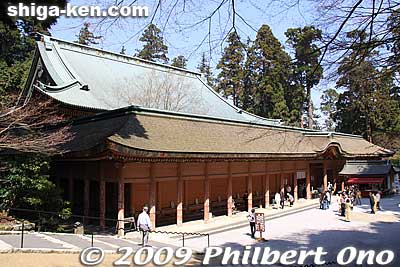 Enryakuji temple, World Heritage Site More Otsu photos here. Enryakuji temple, World Heritage Site More Otsu photos here.
| ||

| ||
| Location | Shiga Prefecture, Kinki region, Honshu island, JAPAN | |
| Population | 344,470 (?? foreigners) (2022-10-01) | |
| Area | 374.06 km² | |
| City Centers | Hama-Otsu, Sakamoto, Mt. Hiei, Omi-Maiko, Katata, Zeze | |
| Major Sights | Enryaku-ji Temple, Ishiyama-dera, Ukimido temple, Lake Biwa boat cruise | |
| Major Gateways | JR Tokaido Main Line Otsu Station, Ishiyama Station, Kyoto Station (Kyoto); JR Kosei Line Yamashina Station (Kyoto) | |
| Train Stations | JR Tokaido Main Line Otsu Station, Zeze Station, Ishiyama Station, Seta Station; JR Kosei Line Otsukyo Station, Karasaki Station, Hie-zan Sakamoto Station, Ogoto Onsen Station, Katata Station, Ono Station, Wani Station, Horai Station, Shiga Station, Hira Station, Omi-Maiko Station, Kita-Komatsu Station | |
| Claim to Fame | Capital of Shiga Prefecture. Otsu was also once the capital of Japan when Emperor Tenji moved the capital to Otsu in 667. World Heritage Site temples together with Kyoto. | |
| Products | Otsu-e prints | |
| Neighbors | Kusatsu, Takashima, Koka, Kyoto | |
| Old Name(s) | Omi-no-Otsu-no-miya, Omi-no-miya, Otsu-no-miya 近江大津宮 | |
| Keywords | Emperor Tenchi | |
| Historical Persons | Emperor Tenchi, Tendai-shu founder Saicho, Murasaki Shikibu | |
| Links | Otsu Articles | Otsu Photos | |
| Otsu Tourist Information | ||
| Location | JR Otsu Station and other stations below | |
| Phone | Otsu Office 077-528-2772
Otsu Station 077-522-3830 Katata Station 077-573-1000 Ogoto Spa 077-578-1650 Ishiyama Station 077-534-0706 Sakamoto 077-578-6565 Shiga-cho 077-592-0378 | |
| Tourist Links | Tourism Ass. | |
| Int'l Association | Web site Phone: 077-525-4711 | |
| Volunteer Guides | Website | |
| Otsu City Hall 大津市役所 | ||
| Address | 〒520-8575 滋賀県大津市御陵町3-1
Goryocho 3-1, Otsu, Shiga 520-8575 JAPAN | |
| Phone/Fax | 077-523-1234 | |
| Official Site | Japanese | | |
| Symbols | Flower: | Eizan Sumire |
| Tree: | Yamazakura mountain cherry tree | |
| Bird: | Black-headed Gull (yurikamome) | |
| Others: | Otsu-e pictures | |
| Logo: | 
| |
| Sister Cities | Lansing, Michigan, USA; Interlaken, Switzerland; Wurzburg, Germany; Mudanjiang, China; Kumi, The Republic Korea | |
by Philbert Ono, Updated: Nov. 12, 2022
Capital of Shiga Prefecture
Otsu (大津市; Otsu-shi) is a city in southern Shiga Prefecture, Japan and the prefecture's capital. The Shiga Prefectural Government building is near JR Otsu Station.
Famous for:
- Prefecture capital and most populous city of Shiga Prefecture.
- Gateway to southern Lake Biwa with boat cruises and sandy beaches (especially Omi-Maiko).
- Sacred Mt. Hiei and Enryakuji Temple, World Heritage Site.
- National Treasure temples and shrines including Miidera, Ishiyama-dera, and Hiyoshi Taisha.
- Major festivals including Sanno Matsuri and Otsu Matsuri.
- Omi Hakkei (Eight Views of Omi) including Ukimido Floating Temple at Katata, pine tree at Karasaki Shrine, and Seta-no-Karahashi Bridge.
One of Shiga's main gateways and adjacent to Kyoto (10 min. by train), Otsu occupies almost the entire southern shore of Lake Biwa. It thus has a very long lakeshore coast. Best known for World Heritage Site temples such as Enryakuji on Mt. Hiei (one of Japan's three most sacred temple mountains) and National Treasures at Ishiyama-dera and Miidera (Onjoji) temples. It also boasts white sand beaches along the western shore and cruises on Lake Biwa.
Otsu, with its Kyoto-influenced temples, convenient transportation links to Kyoto, lake beaches frequented by Kyotoites, and the Lake Biwa Canal supplying water to Kyoto (and Osaka), is almost a satellite or extension of neighboring Kyoto and has never really developed its own unique identity. However, it is an interesting city in its own right with many major places of interest of its own.
The main city center is around Biwako Hama-Otsu Station on the Keihan Line and next to the boat cruise port, shopping mall, and hotels. Most of Otsu's attractions are along the Keihan Line instead of the Tokaido Line. Otsu Station has also been totally renovated and now boasts a great choice of restaurants and a capsule hotel. Here and there in Otsu, you may also see Otsu-e paintings of an ogre or wisteria maiden, one of Shiga's unique art forms.
For the 2020 Tokyo Olympics, Shiga Prefecture and Otsu supposed to be the host town for Denmark's rowing team.
Sights

| 
| 
|
| Ishiyama-dera Genji Room | Omi-Maiko | Enryakuji Konpon Chudo |
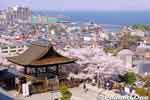
| 
| 
|
| Miidera temple | Otsu Matsuri | Sanno Matsuri |

| 
| 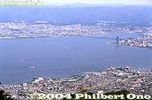
|
| Katata Ukimido | Karasaki | Hiei-zan Driveway |
Must See
- Enryakuji 延暦寺 - One of the largest temple complexes in Japan, Enryakuji is the headquarters of the Tendai Buddhist sect and World Heritage Site atop Mt. Hie (elevation 848 m) in Otsu, Shiga Prefecture. The temple was founded by Saicho to protect Kyoto from the demons of the northeast. Mt. Hiei can be called the birthplace of Japanese Buddhism as many founders of Japanese Buddhist sects once trained on Mt. Hiei. They include Honen (Jodo-shu), Shinran (Jodo Shinshu), and Nichiren. The entire mountain is the grounds of Enryakuji Temple and used as a religious training ground for centuries. The mountain is consdered to be the "body" of the founder and the trees are his religious clothing. Temple priests therefore carefully maintain trees and plants on the mountain. However, like in other parts of Shiga, wild deer has been a problem for trees and forests for the past 30 years. The temple's main worship hall, the Konpon Chudo (National Treasure), is undergoing a major 10-year renovation until 2025. While parts of it might be covered or closed to visitors, part of the renovation work is also open to the public. A rare look at how they repair a temple. The mountain also has the scenic Hie-zan Driveway offering panoramic views of Lake Biwa. Map
- Ishiyama-dera 石山寺 - Founded in 749, Ishiyama-dera, belonging to the Shingon Buddhist Sect, is the 13th Temple of the Saigoku Pilgrimage. Lady Murasaki Shikibu is said to have written the epic novel, "The Tale of Genji" in a room at this temple. The fall colors are also brilliant. Map
- Miidera 三井寺 - Established in the 7th century, Miidera temple, or Onjoji, is one of Otsu's major temples and one of Japan's four largest temples. It is the headquarters temple of the Tendai Jimon Buddhist Sect and former rival of Enryakuji temple on Mt. Hiei. It is a complex of numerous structures including National Treasures and Important Cultural Properties. The temple bell is famous for being one of the Omi Hakkei (Eight Views of Omi) depicted in ukiyoe prints. Cherry blossoms in April are also lit up at night. Map
- Hiyoshi Taisha 日吉大社 - Near Sakamoto Station (Keihan Railways) and Hie-zan Sakamoto Station (JR Kosei Line), this shrine is noted for National Treasures. The fall leaves in Nov. with 3,000 maple trees are also lit up at night 5:30 - 9 pm. In April, it holds the Sanno Festival. Map
- Katata Ukimido 堅田 浮御堂 - The Ukimido Floating Temple in Lake Biwa, Katata, Shiga Prefecture is famous as one of the Omi Hakkei (Eight Views of Omi). It's still in a scenic environment jutting over the lake. Today, the temple is supported by strong concrete pillars instead of wooden stilts of long ago. Map
- Michigan Paddlewheel Cruise - Operates from Otsu for pleasure cruises on the lake. Other boat cruises start from Nagahama, Hikone, and Omi-Imazu to Chikubushima and Takeshima. Map
- Omi-Maiko 近江舞子, Wani, and other beaches on the western shore of Lake Biwa are popular in summer for their white sand beaches and proximity to Kyoto city. Map
- Hie-zan Driveway 比叡山 and Mt. Hiei - Great views of Lake Biwa on the west side. Home of Enryakuji Temple. Map
Other Sights
- Omi Jingu 近江神宮 - Dedicated to Emperor Tenji (Tenchi) who moved the capital to Otsu. The shrine holds a karuta card contest in Jan. and yabusame horseback archery on Nov. 3. Also nearby are two Otsu Palace sites in Nishikori where Japan's capital was located for 5 years from 667. Near Keihan Line Omi-Jingu-mae Station. Map
- Karasaki Jinja Shrine 唐崎神社 - Famous for the Karasaki pine tree, noted as an Omi Hakkei. Map
- Lake Biwa Canal (Biwako Sosui) 琵琶湖疎水 - Not exactly a tourist attraction except in April where cherry trees are planted, but a vital water link for Kyoto and Osaka which depend on Lake Biwa for its water supply. There are also Lake Biwa Canal boat cruises that go through the canal (including long, dark tunnels) between Otsu and Kyoto (Keage or Yamashina). Lake Biwa Canal boat cruises run from late March to late June, and from October to November. Cherry blossom and autumn foliage seasons are always fully booked. Reservations can be made from mid-Feb. for spring and from late Aug. for autumn. However, as of this writing, the online reservations page is in Japanese only. Map
- Takebe Taisha Shrine - Near the east end of Seta-no-Karahashi Bridge. Holds the Senko-sai Festival in Aug. Map
- Seta no Karahashi Bridge and Setagawa River - Spanning the Seta River and depicted in woodblock prints. Seta River is the only river flowing out of Lake Biwa. Also the site for rowing regattas. Map
- Gichuji Temple - The grave of Haiku poet Basho Matsuo is here, along with many haiku-related monuments. Map
- Otsu Nagisa Waterfront Park - Otsu dominates southern and southwestern Shiga Prefecture. It has a long lake shore. Map
- Biwako Flower Fountains - Colorful water fountains lit up at night at Otsu Port. Map
- Zeze Castle Park - Site of Zeze Castle along the lakeshore, only a stone foundation remains. Map
- Biwako Valley and Biwako Terrace - Skiing in winter, and fine views of Ostu and Lake Biwa from Biwako Terrace, a spectacular lookout deck and restaurant. Map
- Ogoto Spa - Famed hot spring along the western lakeshore near Ogoto Onsen Station.
- Top of Otsu - Great views of Otsu and the southern tip of Lake Biwa from the top-floor restaurant in the Otsu Prince Hotel. The city's tallest building. Map
- Shiga Museum of Art (Shiga-kenritsu Bijutsu-kan 滋賀県立美術館) - After major renovations from April 1, 2017 to 2021, the museum reopened on June 27, 2021 and was renamed "Shiga Museum of Art." It was formerly "The Museum of Modern Art, Shiga" (Shiga-kenritsu Kindai Bijutsu-kan 滋賀県立近代美術館). The "modern art" was dropped in the new name since it is no longer limited to modern art. First opened in Aug. 1984 as a first-class modern art museum in a scenic park. Kind of out of the way, but worth a visit. Map
Event Calendar
- 2nd Sun. in March - Lake Biwa Mainichi Marathon - This event has been discontinued. Held for the last time in 2021. However, there are plans to start a new public marathon named "Biwako Marathon" (びわ湖マラソン) on March 12, 2023. Planned route starts in Otsu, goes along the lake to Moriyama, and finishes near Lake Biwa Museum.
- April 12-14: Sanno-sai Festival 山王祭 - Held by Hiyoshi Taisha Shrine and one of Shiga Prefecture's largest festivals, the annual Sanno Matsuri is held during April 12-14 and features processions, violent rocking of portable shrines, and a boat procession on Lake Biwa. Map
- 1st Sun. in June - Omi Jingu Shrine Yabusame, Otsu. Yabusame horseback archery starts with a ceremony at the shrine. On the horse track at the shrine entrance, reserved seating and free standing room are provided to watch a bevy of horseback archers trying to hit targets as they gallop down the track at full speed. Video here
- Aug. - Lake Biwa Summer Festival - Near Biwako Hama-Otsu Station, a variety of entertainment and Bon dancing called Goshu Ondo in Shiga.
- Aug. 7 or 8 - Grand Lake Biwa Fireworks - Aerial and water fireworks off the shore in central Otsu near Biwako Hama-Otsu Station (admission required) or the free area around Nagisa Park.
- Aug. 17 - Takebe Taisha Senko-sai Festival - One of Otsu's Big Three Festivals, the Senko-sai is a portable shrine procession on boats going down Seta River from Seta-no-Karahashi Bridge to Nango sluice and back. Held annually by Takebe Taisha Shrine near the bridge. The festival starts at 5 pm when the portable shrines leave the shrine, and climaxes with fireworks on Seta River after the boats return at about 8:00 pm. Map
- Weekend before second Monday in Oct.: Otsu Matsuri Festival 大津祭 - One of Shiga's major festivals featuring thirteen ornate floats displayed and paraded around central Otsu over two days before Sports Day, a national holiday on the second Mon. in Oct. The first day on Sat. of the festival has the floats parked and displayed on the streets and lit up at night (Yoimiya) with musicians playing. The second day is the festival climax with a procession of all the floats highlighted by performances by karakuri mechanical dolls on the floats. Within walking distance from Otsu Station. One of Shiga's major festivals.
- Oct. - Apr.: Shiga Lakestars regular season games are held on weekends. Otsu is home to the Shiga Lakestars pro basketball team in the bj-league. Many of the home games are played at the Shiga Prefectural Gym. For the home game schedule, see their official site (Japanese).
Travel Tips
- Otsu is a long city in length. Trains, streetcars, and buses can take you to most places of interest. By train when coming from the east (Maibara, Nagoya, etc.), getting off at Ishiyama Station is convenient since you can transfer to the Keihan Railways streetcar line which runs through the middle of the city all the way to Sakamoto (Mt. Hiei and Enryakuji). The city's major sights are along this streetcar line (Ishiyama-dera, Keihan Zeze, Biwako Hama-Otsu, Miidera, Omi Jingu-mae, and Sakamoto). From Otsu Station, which has a tourist info office, you can walk to Biwako Hama-Otsu or take a bus to various places. To visit the western side of the city such as Omi-Maiko, go to Yamashina Station in Kyoto or Otsukyo Station to catch the Kosei Line.
- Current for central Otsu here (Japan Meteorological Agency).
Getting There
| Otsu's official mascot: Hikaru-kun |
Otsu is next to Kyoto, so take the shinkansen bullet train to Kyoto Station, then the Tokaido/Biwako Line train to Otsu Station or Yamashina Station if you will travel on the Kosei Line. From Yamashina Station, you can also transfer to Keihan Yamashina Station to take the Keihan Keishin Line to Biwako Hama-Otsu which also connects to the Keihan Ishiyama-Sakamoto Line. In eastern Otsu, Ishiyama Station is another gateway to Otsu where you can transfer to the Keihan Ishiyama-Sakamoto Line.
Getting Around
Otsu has numerous train and streetcar stations as well as bus routes. The major sights and facilties along the train and Keihan Railways streetcar lines are as follows.
Wheelchair users and baby stroller users should be aware that some train stations in Otsu do not have elevators, escalators, or ramps, especially the smaller stations on the JR Kosei Line and Keihan Lines. Click on the train station link to see if it is wheelchair accessible.
JR Tokaido Line (東海道線・琵琶湖線)
- Seta Station (瀬田駅) - By bus, go to the "Bunka Zone" (Culture Zone) that has a Japanese garden, the Shiga Prefectural Library, and the The Museum of Modern Art, Shiga.
- Ishiyama Station (石山駅) - Ishiyama-dera Temple is a must-see and the Seta River and Seta Karahashi Bridge are also historic places. Ishiyama is also a Keihan streetcar stop which cuts through Otsu.
- Zeze Station (膳所駅) - Zeze Castle ruins. Also near to Otsu's shopping area.
- Otsu Station (大津駅) - Except for the Shiga Prefectural Government, there's not much near Otsu Station. The lake is within walking distance (around 20 min.), but not recommended if you have heavy luggage. Otsu Station was recently renovated in Oct. 2016 and now has a good choice of restaurants including Starbucks and The Calendar which includes a capsule hotel. The Otsu tourist information center offers free rental bicycles.
JR Kosei Line (湖西線)
This train line runs on the west side of the city and lake. Wheelchair users and baby stroller users should be aware that Horai, Shiga, Hira, Omi-Maiko, and Kita-Komatsu Stations do not have elevators, escalators, or ramps.
Going to northern Shiga:
- Otsukyo Station (大津京駅) - Omi Jingu Shrine, Ojiyama Kofun Tumulus are nearby. (This train station was Nishi-Otsu Station and renamed "Otsu-kyo" 大津京駅 on March 15, 2008.)
- Karasaki Station (唐崎駅) - Karasaki Jinja Shrine (Karasaki Pine)
- Hie-zan Sakamoto Station (比叡山坂本駅) - Hiyoshi Taisha Shrine, Saikyoji Temple, Hie-zan Sakamoto Cable Car to Enryakuji Temple on Mt. Hiei. Rental bicycles at nearby Sakamoto Station (Sakamoto Tourist Association office) on the Keihan Ishiyama Sakamoto Line.
- Ogoto Onsen Station (おごと温泉駅) - Ogoto Hot Spring. There's a nice foot bath with hot spring water outside the station. It's free. (This train station was Ogoto Station and renamed "Ogoto Onsen" おごと温泉駅 on March 15, 2008.)
- Katata Station (堅田駅) - Ukimido Floating Temple, Biwako Ohashi Bridge (west end).
- Ono Station (小野駅) -
- Wani Station (和邇駅) - Wani-hama Beach
- Horai Station (蓬莱駅) - Horai-hama Beach
- Shiga Station (志賀駅) - Biwako Valley ski grounds and Biwako Terrace (via ropeway), Katsuragawa Keikoku Gorge,
- Hira Station (比良駅) - Hira mountains
- Omi-Maiko Station (近江舞子駅) - Shiga's most popular beach is Omi-Maiko where many Kyotoites also come in the summer. White-sand beaches.
- Kita-Komatsu Station (北小松駅) - Yobai no Taki Falls, Hira Genkimura.
Keihan Ishiyama-Sakamoto Line (京阪石山坂本線)
Otsu's main streetcar line connecting one end of the city to the other.
- Ishiyama-dera Station (石山寺駅) - Visit Ishiyama-dera temple and Setagawa River.
- Karahashi-mae Station (唐橋前駅) - Visit the famous Seta Karahashi Bridge, Seta River, and Takebe Taisha.
- Keihan Ishiyama Station (京阪石山駅) - Transfer to JR Ishiyama Station on the Tokaido Main Line.
- Awazu Station (粟津駅) -
- Kawaragahama Station (瓦ヶ浜駅) -
- Nakanosho Station (中ノ庄駅) -
- Zeze Hommachi Station (膳所本町駅) - Visit Zeze Castle Park famous for cherry blossoms.
- Nishiki Station (錦駅) -
- Keihan Zeze Station (京阪膳所駅) - Visit Gichuju temple (Basho's grave). Also near the shopping area (Seibu and Parco). Also transfer to JR Zeze Station.
- Ishiba Station (石場駅) - Visit Biwako Hall, Piazza Omi, and lakeside park.
- Shimanoseki Station (島ノ関駅) - Near the lakeside park (summer fireworks) and Shiga Prefectural Government.
- Biwako Hama-Otsu Station (びわ湖浜大津駅) (formerly Hama-Otsu Station) - Main city center with Otsu Port for lake cruises, Aqus shopping mall, Biwako Hotel, Otsu Castle site, and Otsu International Goodwill Association. City library also nearby.
- Miidera Station (三井寺駅) - Visit the famous Miidera temple and Lake Biwa Canal (Biwako Sosui). Also the Lake Biwa Rowing Song monument.
- Otsu Shiyakusho-mae Station (大津市役所前駅) (formerly Bessho Station) - Visit Otsu City Hall, Otsu History Museum, Ojiyama Sports Park, and Ojiyama Stadium.
- Keihan Otsukyo Station (京阪大津京駅) (formerly Ojiyama Station) - Ojigaoka Park, Ojiyama Sports Park, also transfer to JR Otsukyo Station on the Kosei Line.
- Omi Jingu-mae Station (近江神宮前駅) - Visit Omi Jingu Shrine dedicated to Emperor Tenchi. Also see site of Omi-Otsu Palace Nishikori.
- Minami-Shiga Station (南滋賀駅) -
- Shigasato Station (滋賀里駅) -
- Ano Station (穴太駅) - Ano-style castle stone walls originated in this area.
- Matsunobamba Station (松ノ馬場駅) -
- Sakamoto Station (坂本駅) - Another major tourist center in Otsu. Visit Sakamoto temple town at the foot of Mt. Hiei and Hiyoshi Taisha Shrine. Walk to Hiezan cable car station to go up Mt. Hiei to visit Enryakuji.
Keihan Keishin Line (京阪京津線)
Streetcar line connecting Otsu and Kyoto.
- Misasagi Station (御陵駅) - Transfer to Tozai Line (Kyoto).
- Keihan Yamashina Station (京阪山科駅) - Transfer to JR Tōkaidō Line and Kosei Line and Tozai Line (Kyoto).
- Shinomiya Station (四宮駅) -
- Oiwake Station (追分駅) -
- Otani Station (大谷駅) -
- Kami-sakaemachi Station (上栄町駅) - Former stage town of Otsu-juku on the Tokaido Road.
- Biwako Hama-Otsu Station (びわ湖浜大津駅) - Main city center with Otsu Port for lake cruises, Aqus shopping mall, Biwako Hotel, Otsu Castle site, and Otsu International Goodwill Association. City library also nearby.
Hiezan Railway Sakamoto Cable Stations (京阪京津線)
Cable railway to reach Mt. Hiei and Enryakuji temple from Sakamoto at the foot of Mt. Hiei in Otsu.
- Cable Sakamoto Station (ケーブル坂本駅) - At the foot of Mt. Hiei in Shiga. Near Sakamoto Station on the Keihan Line and Hiyoshi Taisha Shrine.
- Horaioka Station (ほうらい丘駅) - Newest station opened in 1984 to enable people to see stone buddhas. A small cave with the buddhas is visible from the cable car. The cable car stops here only upon request.
- Motateyama Station (もたて山駅) - Nearby is the grave of poet Ki no Tsurayuki (紀 貫之).
- Cable Enryakuji Station (ケーブル延暦寺駅) - Terminal station atop Mt. Hiei. A short walk away is Enryakuji temple. This is the original building that has been used since the cable railway opened between Sakamoto and Mt. Hiei in 1927. It was Japan’s longest cable car route (2,025 meters) at the time. The first floor is the station, while the 2nd floor used to be a VIP room. The 2nd floor is now an exhibition room open to the public. It also has a nice lookout deck. The distinguished-looking building is a National Registered Tangible Cultural Property (登録有形文化財).
Maps
Placemarks in Google Maps are in English. Click on upper right icon to enlarge.
Photos
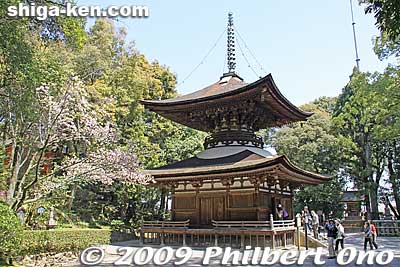
| 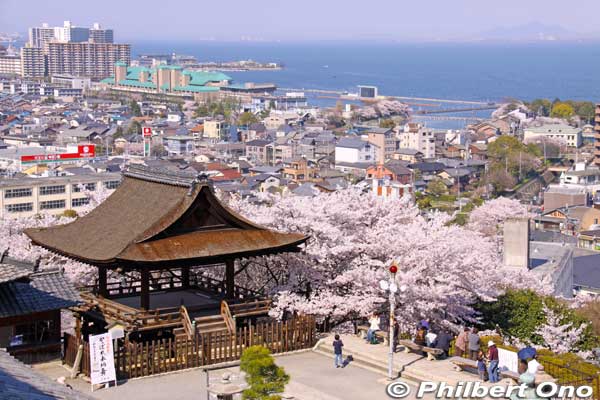
|
| Tahoto pagoda, Ishiyama-dera | Miidera |
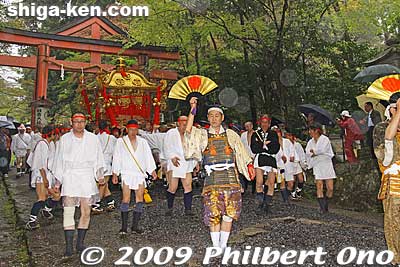
| 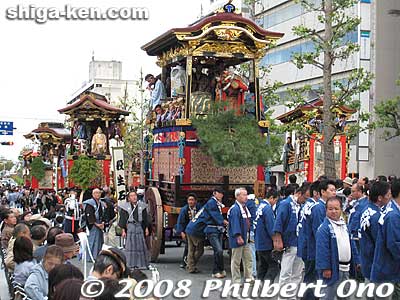
|
| Sanno Matsuri | Otsu Matsuri |
More photos at Otsu Photos.
Videos
Click on the video to start playing it.
More Shiga videos here.
History
- 667 Emperor Tenchi designates Otsu as the nation's capital.
- 672 Jinshin Revolt occurs.
- 1872 Otsu becomes the capital of Shiga Prefecture.
- 1890 The Lake Biwa Canal (Biwako Sosui) is completed to feed water from Lake Biwa to Kyoto.
- 1891 The Otsu Incident occurs on May 11 when Russian Crown Prince Tsarevich Nicholas Alexandrovich (later Tsar Nicholas II) is attacked and wounded in Otsu by a policeman guard named Tsuda Sanzo wielding a saber. Nicholas was on his way back to Kyoto after visiting the Shiga Prefectural Capitol when the attack occurred.
- 1898 The city of Otsu is established.
- 1933 Zeze-cho and Ishiyama-cho town merge with Otsu.
- 1951 Ogoto and Sakamoto Villages merge with Otsu.
- 1967 Seta-cho and Katata-cho towns merge with Otsu.
- 2006 March 20: Shiga-cho town merges with Otsu.
- 2008 Otsu celebrated the Millennium of the Tale of Genji 源氏物語千年紀 (Genji Monogatari Sennenki) with various exhibitions and events mainly at Ishiyama-dera temple. An event venue called Genji Yume-kairo 源氏夢回廊 (main path leading to the temple entrance) at the temple had a few temple buildings holding various exhibitions related to the novel. It was in 1008 when Lady Murasaki completed the epic novel Genji Monogatari after four years. She wrote it in a little room with a view of the moon at Ishiyama-dera in Otsu. The temple itself is a major tourist attraction with National Treasure buildings, spring flowers, and autumn leaves.
- 2016 The renovated Otsu Station building reopens on Oct. 1 as Vierra Otsu with new restaurants such Starbucks, The Calendar (including a capsule hotel), 7-Eleven. The new Otsu Tourist Information Center also rents free bicycles.
Additional Reading
Otsu News - Curated tweets by ShigaHeadlines
Biwako Terrace atop Biwako Valley (elevation 1,100 m) has expanded its scenic tourist attraction with another lookout terrace in the north. The North Terrace has views of Biwako & Hira/Ibuki Mountains. Opened on Aug. 4. The original terrace faces east. #びわ湖テラス #ノーステラス
— Shiga Headlines (@ShigaHeadlines) August 5, 2018
Visited the old Biwako Hotel in Otsu. It's now the Biwako Otsu-kan with a banquet hall, restaurant, & galleries. Larger-than-life building with great lake views. Built in 1934, it takes you back in time. Old photos of US Occupation forces using the hotel 1945–1957 are exhibited. pic.twitter.com/0p0jMc2WVY
— Shiga Headlines (@ShigaHeadlines) December 4, 2017
「市役所」を"City Hall"に統一することは賛成です。その標識や表示を変えるのが大変ですね。 pic.twitter.com/9agFkKZfRl
— Shiga Headlines (@ShigaHeadlines) July 12, 2017
- Renovated Otsu Station reopens - December 12, 2016
- Otsu-e paintings then and now - October 12, 2015
- Otsu Matsuri karakuri puppets explained - October 8, 2014
- Damaged by Typhoon Man-Yi (No. 18) on September 15-16, 2013 - September 24, 2013
- Sanno-sai Festival one of Shiga’s Top 10 festivals in April-May - April 11, 2013
- Nionoumi, sumo wrestler from Otsu - January 28, 2013
- Visiting Seian University of Art and Design - November 23, 2012
Miscellaneous
Trivia
- Otsu City Hall does not meet Japan's earthquake resistance standards. A new city hall might be built in Hama-Otsu.
- Lady Murasaki Shikibu is said to have written the epic novel "Tale of Genji" (Genji Monogatari) in a small room in Ishiyama-dera temple. The temple has a small room and a mannequin of Shikibu showing where she might have written the novel.
Famous People
- Emperor Tenji 天智天皇 - Moved the Imperial capital from Asuka, Nara to Otsu in 667. Omi Jingu Shrine worships this Emperor.
- Lady Murasaki Shikibu - Writer of the famous novel Genji Monogatari (Tale of Genji) in the 11th century. She is said to have wriiten the novel in a room at Ishiyama-dera Temple in Otsu.
- Ogura Yuki
- Painter
- Saicho
- Founder of the Tendai Buddhist sect.
Side Trips
Other sights in neighboring cities/towns within easy reach from Otsu.
- Kyoto
Related Articles
- Shiga Prefecture
- Shiga Prefecture Sights
- History of Shiga Prefecture
- Shiga Prefecture Transportation
External Links
| Municipalities of Shiga Prefecture 滋賀県 | ||
| Cities & Towns: Aisho-cho | Higashi-Omi | Hikone | Hino-cho | Koka | Konan | Kora-cho | Kusatsu | Maibara | Moriyama | Nagahama | Omi-Hachiman | Otsu | Ritto | Ryuo-cho | Taga-cho | Takashima | Toyosato-cho | Yasu | ||
| 愛荘町 | 東近江市 | 彦根市 | 日野町 | 甲賀市 | 湖南市 | 甲良町 | 草津市 | 米原市 | 守山市 | 長浜市 | 近江八幡市 | 大津市 | 栗東市 | 竜王町 | 多賀町 | 高島市 | 豊郷町 | 野洲市 | ||
| Prefectures of Japan | ||
| Aichi | Akita | Aomori | Chiba | Ehime | Fukui | Fukuoka | Fukushima | Gifu | Gunma | Hiroshima | Hokkaido | Hyogo | Ibaraki | Ishikawa | Iwate | Kagawa | Kagoshima | Kanagawa | Kochi | Kumamoto | Kyoto | Mie | Miyagi | Miyazaki | Nagano | Nagasaki | Nara | Niigata | Oita | Okayama | Okinawa | Osaka | Saga | Saitama | Shiga | Shimane | Shizuoka | Tochigi | Tokushima | Tokyo | Tottori | Toyama | Wakayama | Yamagata | Yamaguchi | Yamanashi | ||
